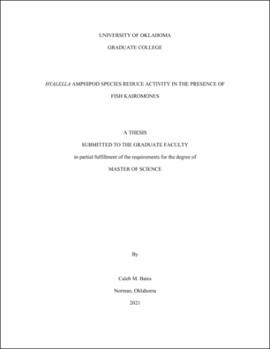| dc.description.abstract | Behaviors and fitness of freshwater prey species can be shaped by their responses to predator kairomones, but it is often unclear which environmental factors mediate these responses and how the responses vary among species. We hypothesized that the presence of fish kairomones will induce a decrease in activity level in Hyalella amphipods because reduction in activity would reduce the threat of mortality from visual predators like fish. We additionally hypothesized that predator diet and the timing of predator food consumption are environmental factors that may modulate antipredator responses of prey. To understand how behavioral antipredator responses vary among species, we measured activity levels of two congeneric freshwater amphipod species, Hyalella wakulla and Hyalella wellborni, in response to kairomones released by bluegill sunfish (Lepomis macrochirus). To evaluate antipredator responses of Hyalella to fish kairomones, and behavioral differences between amphipod species, we measured the activity levels of both species in the presence and absence of bluegill kairomones. We varied fish diets to determine how predator diet influences a prey’s antipredator response. Fish were fed either commercial freeze-dried bloodworms, live Hyalella, or left unfed. We also manipulated time between a fish’s last feeding and the exposure of amphipods to their chemicals. We investigated whether this time interval may have an important influence on antipredator response, which would be expected if kairomone release is strongly connected to the act of food consumption and subsequent excretion. We found that both amphipod species dramatically lowered their activity levels in response to the presence of fish kairomones. Activity level of H. wakulla dropped by 67% in the presence of fish and H. wellborni activity level was reduced by 50%. Additionally, neither the timing of food consumption nor variation in fish diet significantly influenced the antipredator response in either amphipod species. These findings demonstrate that Hyalella amphipods strongly reduce activity in the chemical presence of a common fish, but this behavioral response was not significantly influenced by the fish’s diet or the time since the predator last consumed food. This antipredator response is shared by the two Hyalella species tested. Hyalella amphipods perceive and then alter their behavior in response to one or more chemicals released by fish. This study highlights the substantial effect of predator kairomones on the behavior of freshwater invertebrates like Hyalella. | en_US |
